Moral dilemmas aren’t meant to be easy. Sometimes, figuring out the right thing to do is overwhelming and you feel judged by your peers. One internet user, u/AntiYourOpinion, asked the AITA community for some impartial advice on a particularly sensitive matter where pragmatism clashed with social niceties and decency.
According to the author, their coworkers are all donating some of their paid time off to a colleague who has been diagnosed with cancer. All except for the OP who doesn’t see the point in ‘wasting’ the PTO. Now, they’re asking the internet whether they’re in the wrong for being so blunt. Scroll down for the story and to see the mixed reactions it got. Bored Panda reached out to the author, and we’ll update the article as soon as we hear back from them.
Many people expect healthcare workers to be empathetic. However, there are times when this clashes with their personal goals

Image credits: Iakobchuk/Envato (not the actual photo)
A worker turned to the internet for some objectivity after sharing how they refused to support a seriously ill colleague
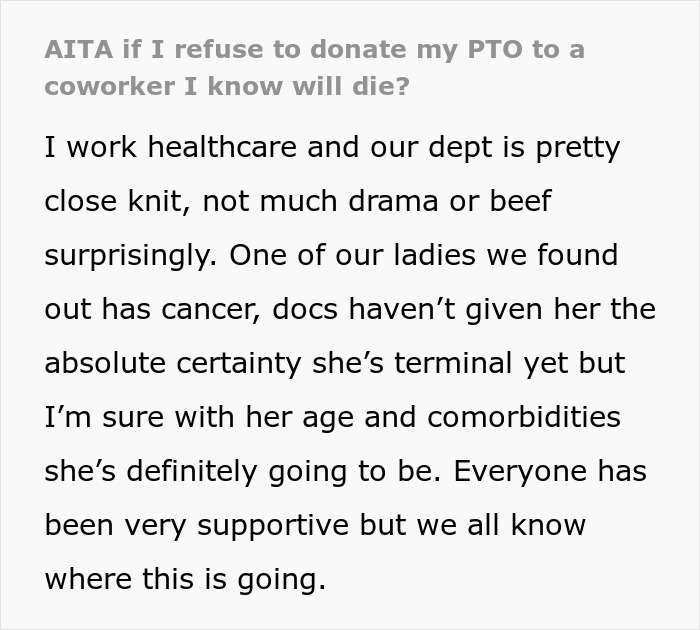
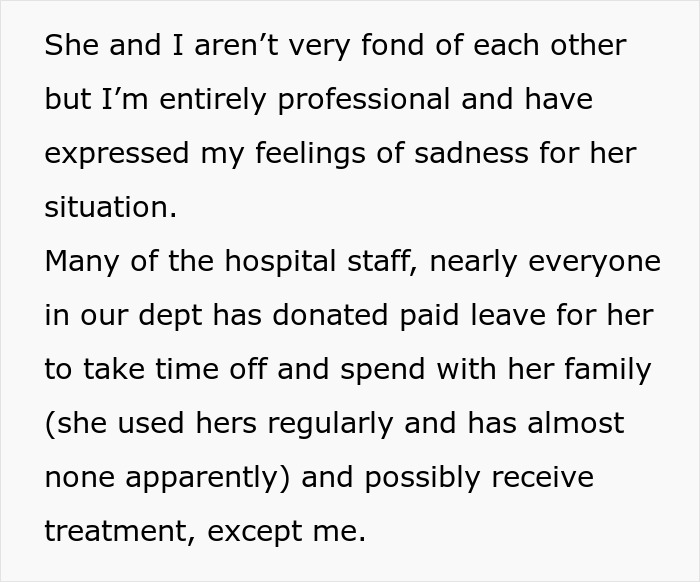
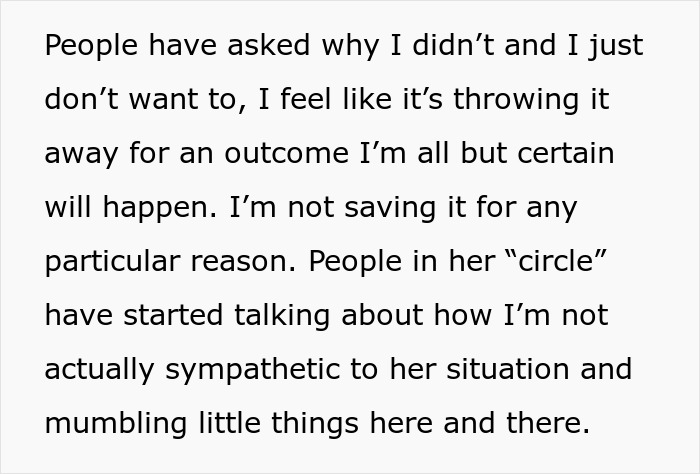

Image credits: Pressmaster/Envato (not the actual photo)

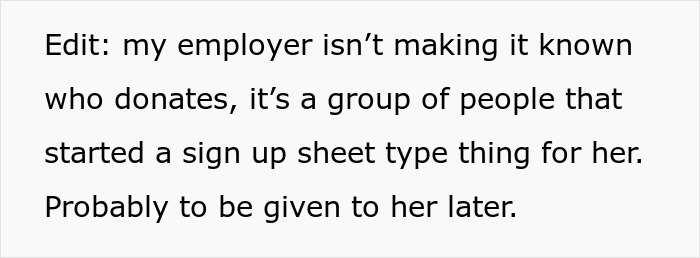
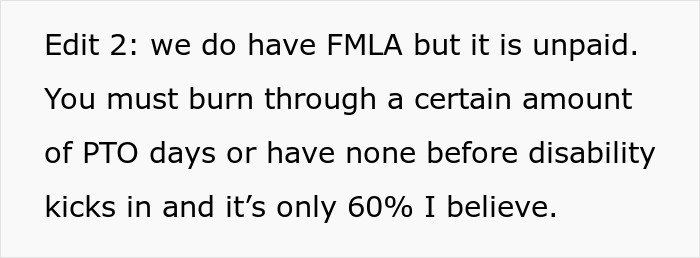
Image credits: AntiYourOpinion
It’s very important to have hope if you’ve been diagnosed with a serious illness

Image credits: seleznev_photos/Envato (not the actual photo)
Though cancer is a horrible, harrowing illness, being diagnosed with it is not an immediate death sentence. Depending on the type of cancer, your lifestyle, and the plan of action your doctors take, you can win the battle if you’re diagnosed early enough.
Cancer Research UK notes that half of people diagnosed in England and Wales survive their disease for 10+ years. The survival rate in the United Kingdom has doubled in the last 50 years, which is a reflection of the advances in medical technology and practices.
A patient’s survival rate heavily depends on the type of cancer they’re fighting. For example, just 1% of people survive pancreatic cancer, but 98% of patients defeat testicular cancer. Over 80% of people with easier-diagnosed and treatable cancers survive for 10+ years.
When it comes to a patient’s age, people under 40 years old have higher chances of surviving cancer. However, there are exceptions. Your chances of survival are highest in middle age if you’re diagnosed with breast, bowel, or prostate cancer.
You can tell a lot about a person and their (lack of) empathy by how they decide to behave in emotionally difficult situations

Image credits: YuriArcursPeopleimages/Envato (not the actual photo)
Life centers on countless decisions that you make every single day about what to prioritize: yourself, your loved ones, your community, or the world as a whole. It’d be ideal if your goals and everyone else’s matched.
Frequently, you have to make certain tradeoffs with their own pros and cons. There’s a constant battle between your authentic self and the persona you present to everyone in public.
For instance, if you always prioritize the needs of others, like your family, friends, and coworkers, you might end up neglecting your own needs too much. You might end up exhausted, burned out, and struggling financially, physically, and mentally. Charity and empathy are all very well and good, but there have to be healthy boundaries. You can’t help others if you don’t help yourself first, after all.
On the flip side, if you always prioritize your personal needs over helping the people in your social circle, you might end up having a reputation for being selfish, arrogant, callous, and cruel. Human beings are also hardwired for empathy and community, not just personal gain. If you constantly avoid creating deep(er) connections with the people around you, you might find yourself socially isolated. And that’s awful for your health and longevity.
Pragmatism can be diplomatic. How you say or do something matters as much as what you choose to say or do

Image credits: AnnaStills/Envato (not the actual photo)
Being pragmatic doesn’t necessarily mean that you have to appear heartless. It helps to consider the potential consequences your actions will have. Not just the immediate ones but also second- and third-order effects, too.
As an example, refusing to cave into social pressure and deciding not to donate your paid time off means that you’ll be able to have a healthier work-life balance, spend more time with your loved ones, and ensure that you’re financially stable while you rest up. Vacations can be a godsend if you’re burning out or you want to focus on your other passions in life aside from your career.
However, it’s not like the refusal to donate PTO—and the decision to bluntly talk about it to colleagues—won’t potentially have some negative consequences. It’s very likely that there’s going to be pushback. The other employees might start thinking of the author as an uncaring, unempathetic individual. The result? Subtle or overt ostracism.
Empathy is hugely important in an industry like healthcare. So, someone who’s creating a reputation for themselves for being overly utilitarian might find themselves sidelined by their colleagues. They might not get the help they need when they need it, like when they need a shift covered or if they require a bit of assistance during work hours. They might miss out on potential promotions because they’re not as trusted as their other colleagues.
Being pragmatic doesn’t necessarily mean being blunt or outwardly cold. Sometimes, the most pragmatic thing to do is to adapt to the circumstances, follow in your social circle’s footsteps, and show that you care about the same things as them (even if you genuinely don’t).
Whatever the final decision, the employee will have to live with the consequences of their actions

Image credits: Wavebreakmedia/Envato (not the actual photo)
Workplaces require a lot of diplomacy to navigate, and a good rule of thumb is to be more subtle whenever you find yourself in the middle of delicate and emotional situations. A few donated days of PTO is a small price to pay for the sake of peace and harmony at work if you plan on continuing your career there.
So, all things considered, the most pragmatic thing to do will depend on your life goals. If you prioritize work-life balance and don’t care about being part of the community at work, then it makes sense to keep as much paid time off as you can, without giving so much as a single day away.
The issue would be moot if the employer decided to support the sick employee more, without her coworkers having to donate their own PTO to her. It’s dystopian to have to rely on crowdsourced time off when you get diagnosed with a serious illness.
What’s your take on the entire situation at the workplace, dear Pandas? Would you donate your personal time off to help a colleague in need or would you keep the days yourself? What do you think it would take to convince the employer to support the ill woman more? Have you ever found yourself in a situation similar to this one? Let us know in the comments how you’d handle things.
The author shared a bit more context in the comments of their post
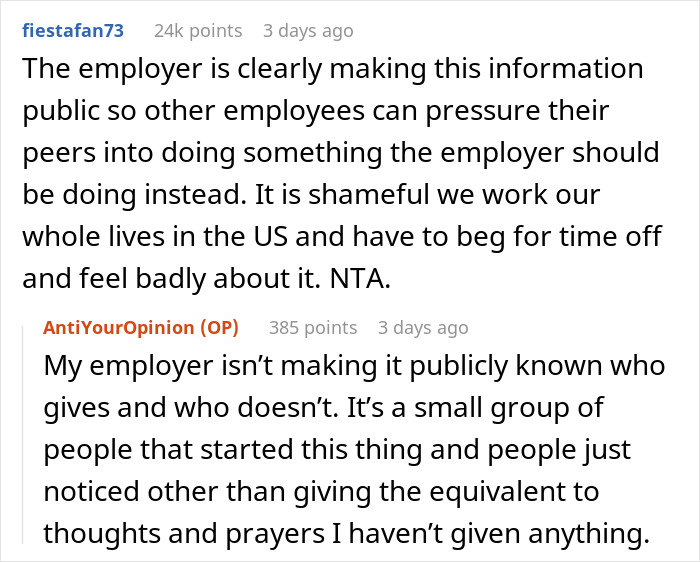
The reactions to the situation were mixed. On the one hand, some readers came out in support of the healthcare worker
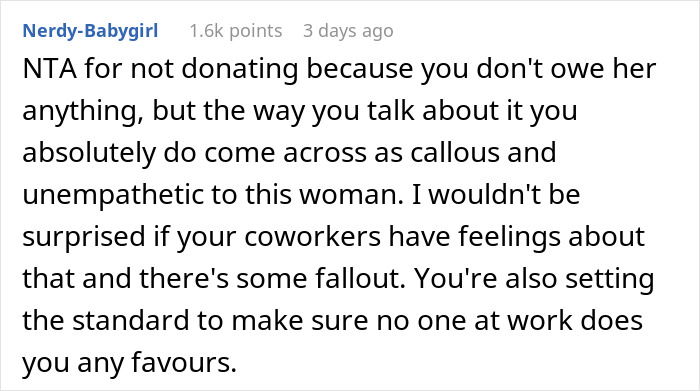
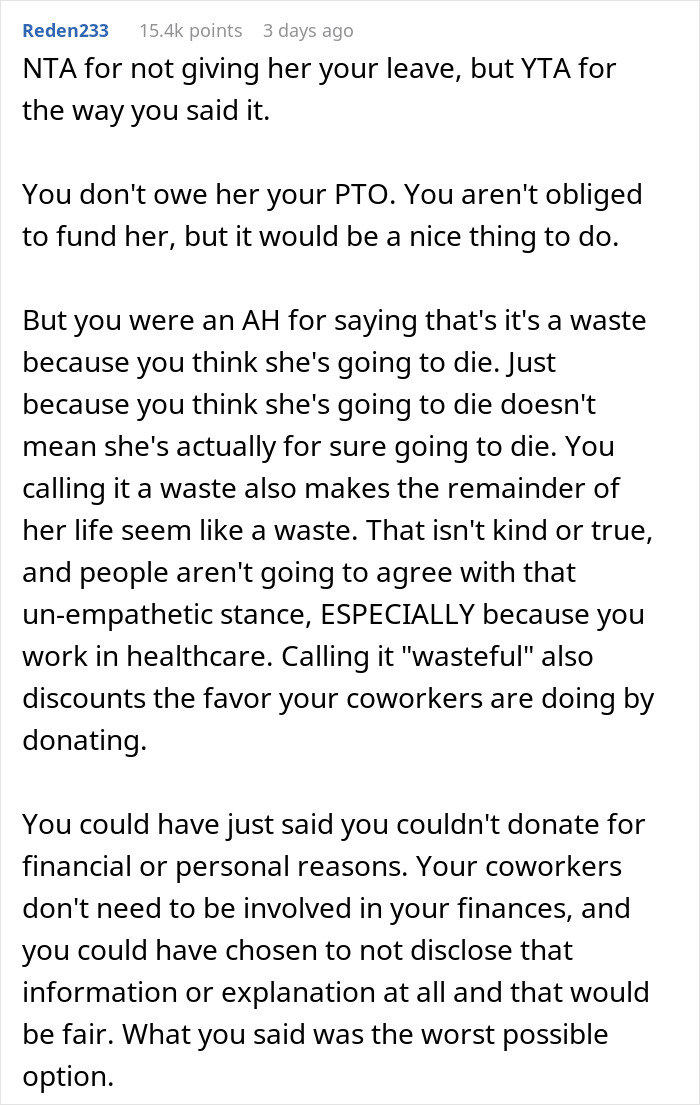

On the other hand, many internet users criticized the author for the way they handled such a sensitive situation
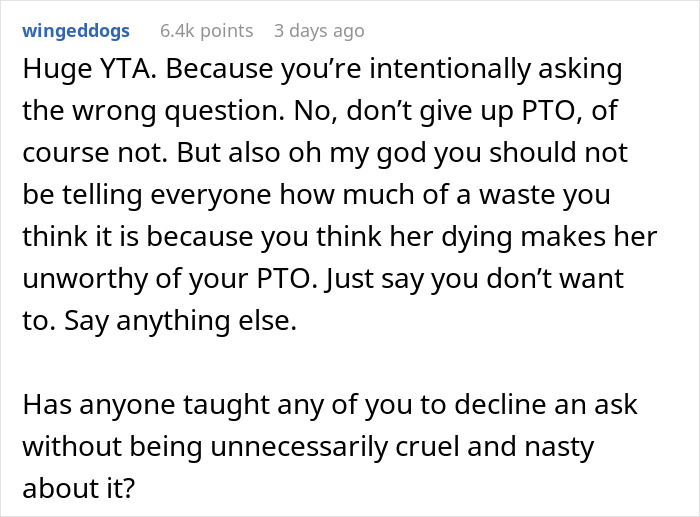
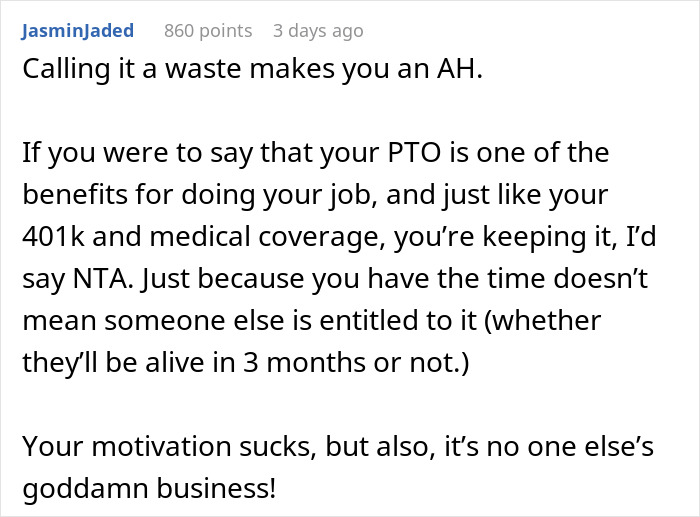
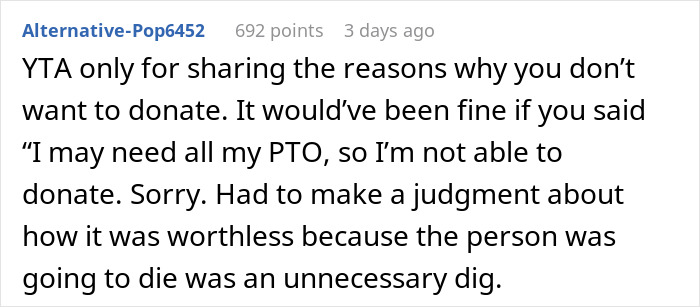
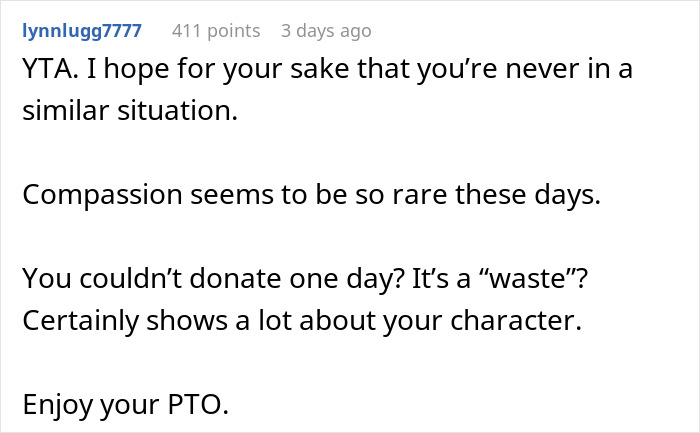
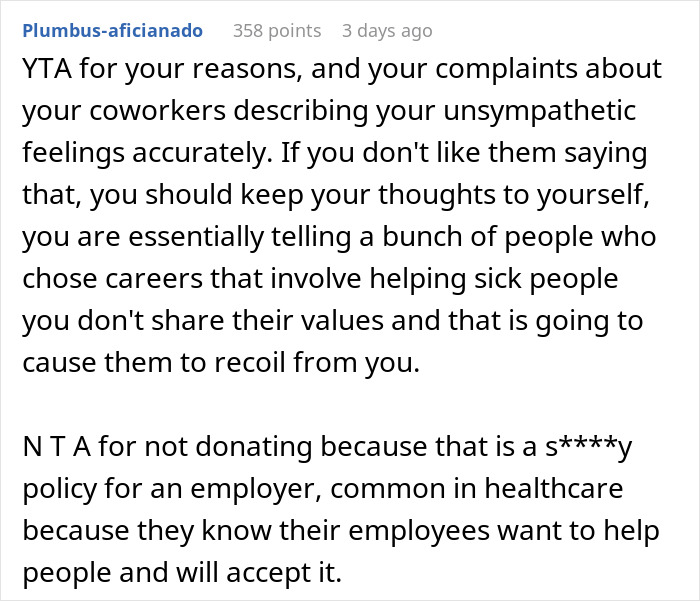
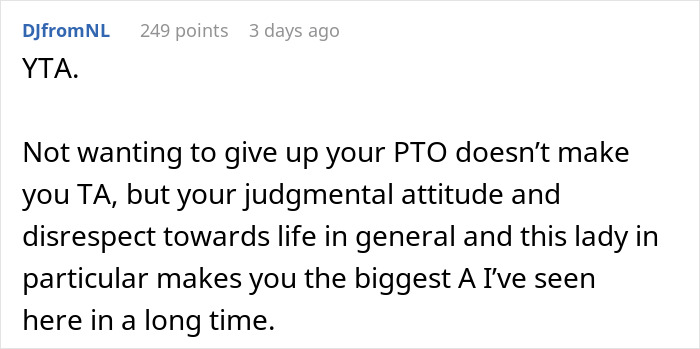
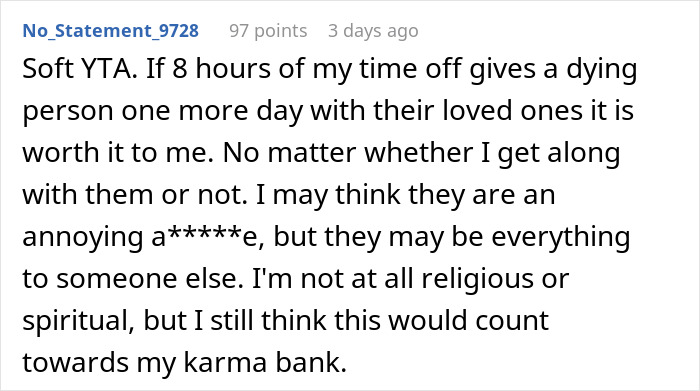

from Bored Panda https://ift.tt/g9Dvewl
ConversionConversion EmoticonEmoticon